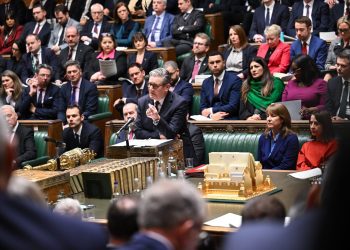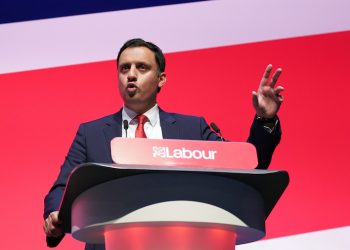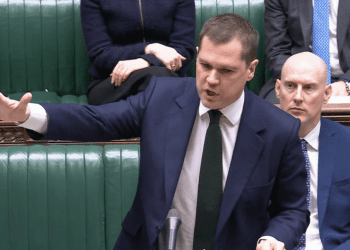The below content first appeared in Politics.co.uk’s Politics@Lunch newsletter, sign-up for free and never miss this daily briefing.
UK inflation fell to 1.7 per cent in the year to September, according to figures published today.
It marks the first time inflation has fallen below the Bank of England’s 2 per cent target for three years. The 1.7 per cent figure is the lowest since April 2021 when it came in at 1.5 per cent.
The reaction from the Labour and Conservative parties has been telling. Chief secretary to the Treasury Darren Jones said the drop “will be welcome news for millions of families”. But, he added, “there is still more to do to protect working people, which is why we are focused on bringing back growth and restoring economic stability to deliver on the promise of change.”
The Labour Party is locked into its pre-budget expectation management operation — and duly refusing to indulge in any economic complacency (lest ministers heighten spirits ahead of 30th October).
The Conservative Party, meanwhile, is busy trying to take credit for the slowing rate of price rises. “Worst economic inheritance since WWII?”, ex-chancellor Jeremy Hunt tweeted sardonically this morning, “Of course”. Expect this argument to be rehearsed at length over the coming weeks — especially with Labour now claiming the £22 billion “black hole” is even deeper and wider than first feared.
But today: a breakdown of all the action at PMQs as Rishi Sunak sparred with Keir Starmer once more.
***Politics.co.uk is the UK’s leading digital-only political website. Subscribe to our daily newsletter for all the latest news and analysis.***
PMQs: Sunak lingers
Rishi Sunak’s sustained presence at the opposition despatch box is fast progressing from tragedy to farce.
By virtue of the unreasonably protracted Tory leadership race, the former prime minister today limbered up for his fifth commons bout with his No 10 successor, Keir Starmer, since the election. And he will face a few more still before his Tory successor is declared on 2 November. (Indeed, on 30th October, Sunak will respond to the budget on behalf of his much-diminished party — a most unenviable task at the best of times).
We are resultantly forced to watch Sunak’s political fossilisation in real time. The ex-PM’s pre-election contributions ever failed to puncture the swelling anticipation of defeat; now his defeat, disastrously actualised, renders his contributions futile.
In the end, Sunak’s lack of political standing means his interventions are only worth listening to if they make some session-defining point. Otherwise, Starmer can dismiss Sunak as the vanquished ex-PM he so badly wanted to avoid becoming — and is.
And yet Sunak returns, like some bloodied boxer peeling themselves off the canvas to demand another pre-bout press conference.
One additional piece of background is that at least one of Sunak’s prospective successors believes he should, in effect, give up. Robert Jenrick has repeatedly called for the leadership contest to be truncated so Sunak can tap out and someone else in. After all, why did the 1922 committee of backbench Tories devise such an, apparently unnecessarily, long leadership contest?
One explanation, of course, is MPs wanted to punish Sunak for his poor premiership. Certainly, the protracted battle failed to contrive a Cameron-style moderate insurgency, as some one nation Tories surely hoped.
***Politics.co.uk is the UK’s leading digital-only political website. Subscribe to our daily newsletter for all the latest news and analysis.***
So — to the session. As has been the case in recent weeks, the Conservative leader was treated today to an array of possible attack lines. In fact, the news yesterday — that Labour looks likely to hike employer national insurance, is ostensibly a win for the former PM. That was the subject of his questioning last week.
But still, Sunak came off worse that session. The ex-PM’s swipes, Starmer rediscovered last week, could be undermined by a few pithy references to the last government’s record.
That may well explain why Sunak opted against an overtly aggressive approach this afternoon. Rather, the former prime minister centred his questions on foreign affairs and national security — with a specific focus on UK-China relations.
There was, ultimately, very little revealing about the exchange. First, Sunak asked Starmer to confirm that the “foreign secretary will use his meetings in Beijing this week to condemn China’s dangerous escalatory acts in the [Taiwan] strait”. The prime minister duly obliged — as did David Lammy’s nodding head.
Then, Sunak raised the case of Jimmy Lai, a British citizen wrongly imprisoned in Hong Kong for four years. The ex-PM asked his successor if it was a “politically motivated prosecution” and a breach of China’s obligations. Starmer said yes.
The session’s plodding momentum was eventually broken when Sunak asked why the government had halted the implementation of the Foreign Influence Registration Scheme, which he introduced as PM. Starmer shot back simply: “That isn’t correct”. And he sat back down.
Sunak’s strategy this week was to deprive the prime minister of any opportunities to propound his talking points ahead of the budget. At times, Starmer looked to be practically bursting at the seams — desperate to lampoon his predecessor’s record. And he eventually broke. He dismissed Sunak’s final “does the prime minister agree…?” question and instead flounced, slightly awkwardly it should be said, into some bellicose broadside.
Labour, Starmer insisted, was elected “to do things differently” from the Conservatives. “So we will fix the foundations for the long term, plan to grow our economy, protect working people and rebuild our country”, he concluded.
The peroration suggested Starmer expected, indeed wanted, a rougher ride. And yet Sunak’s statesman routine robbed him of the political spotlight at this most opportune, pre-budget juncture.
As such, the Conservative leader may well have succeeded in wrong-footing Starmer — as was no doubt the intention of his aides. But note also the string of open goals Sunak chose to avoid around winter fuel payments, the budget and last week’s cabinet row over P&O Ferries. The ex-PM could have even quipped about Taylor Swift.
If the prime minister’s political edge sharpens over the coming weeks, which some nascent signs suggest, Conservative MPs may learn to rue Sunak’s continued presence on the frontbench.
Subscribe to Politics@Lunch
Lunchtime briefing
Kim Leadbeater: MPs have a ‘moral obligation’ to legalise assisted dying
Lunchtime soundbite
‘We are looking at that because they’re obviously abhorrent comments’
— Keir Starmer confirms the government is considering sanctioning Israeli ministers Bezalel Smotrich and Itamar Ben-Gvir. Watch the PM’s full response, and the question from Lib Dem leader Ed Davey that prompted it, here.
Now try this…
‘Keir Starmer and the perils of consensus’
In trying to please everyone, the prime minister risks pleasing no one, writes The New Statesman’s George Eaton. (Paywall)
‘Labour MP wants promised levelling up funding delivered for his town’
Via The Guardian.
‘Reeves’s national insurance wrangling shows the folly of Labour’s tax pledges’
ConservativeHome’s William Atkinson writes.
On this day in 2023:
Truss to challenge Sunak with alternative budget as she rails against ‘conventional thinking’
Subscribe to Politics@Lunch
The post PMQs verdict: Rishi Sunak has long outstayed his welcome appeared first on Politics.co.uk.

































